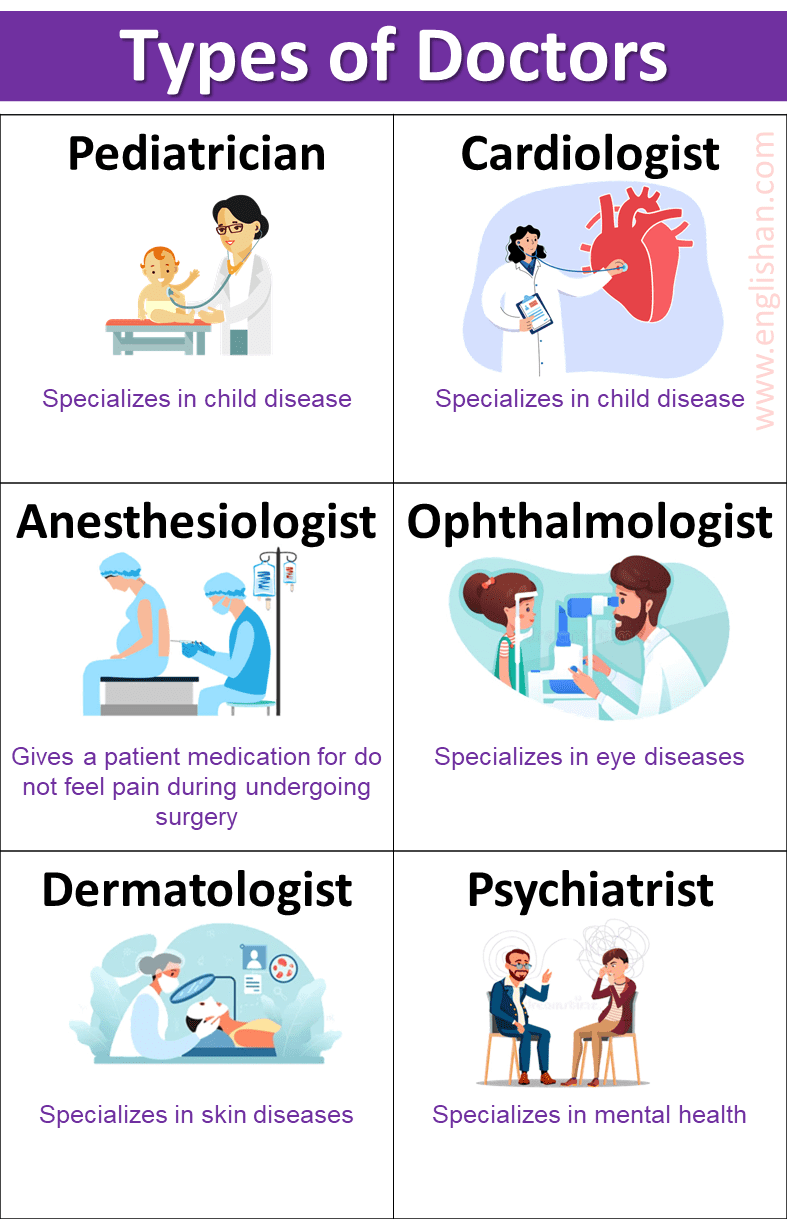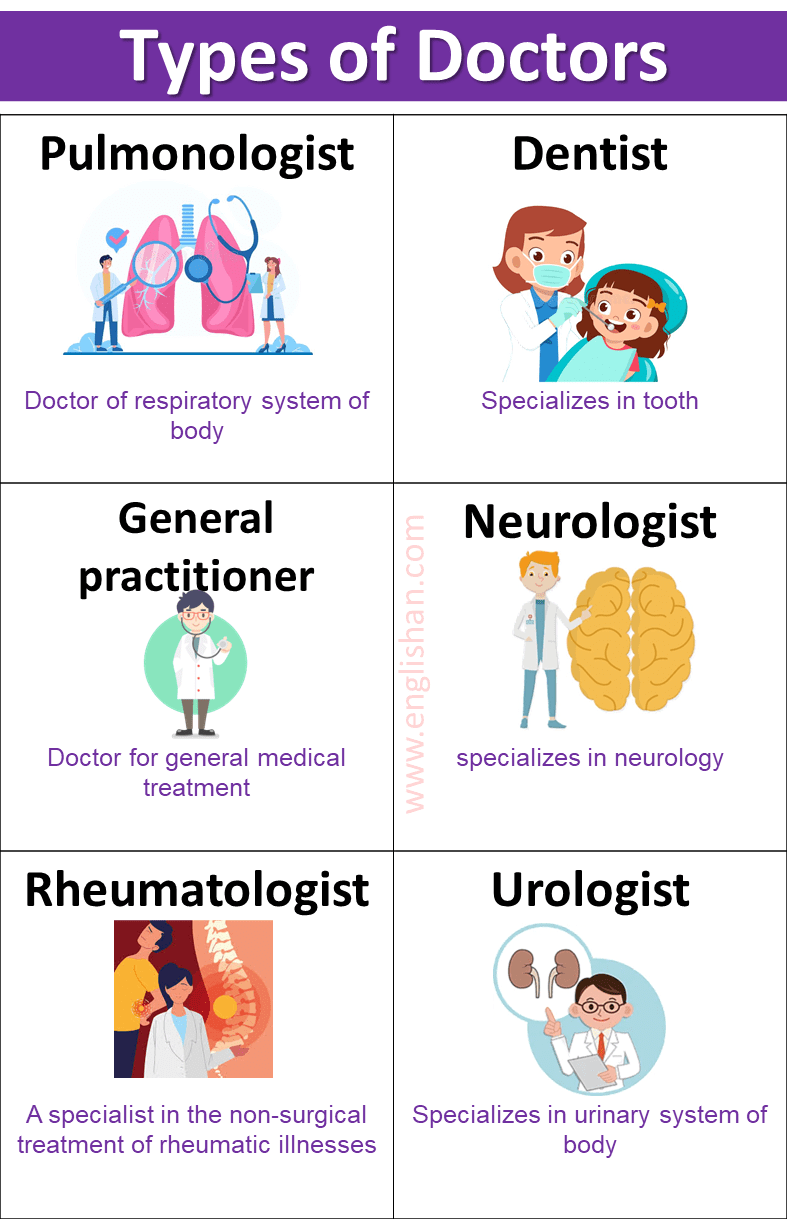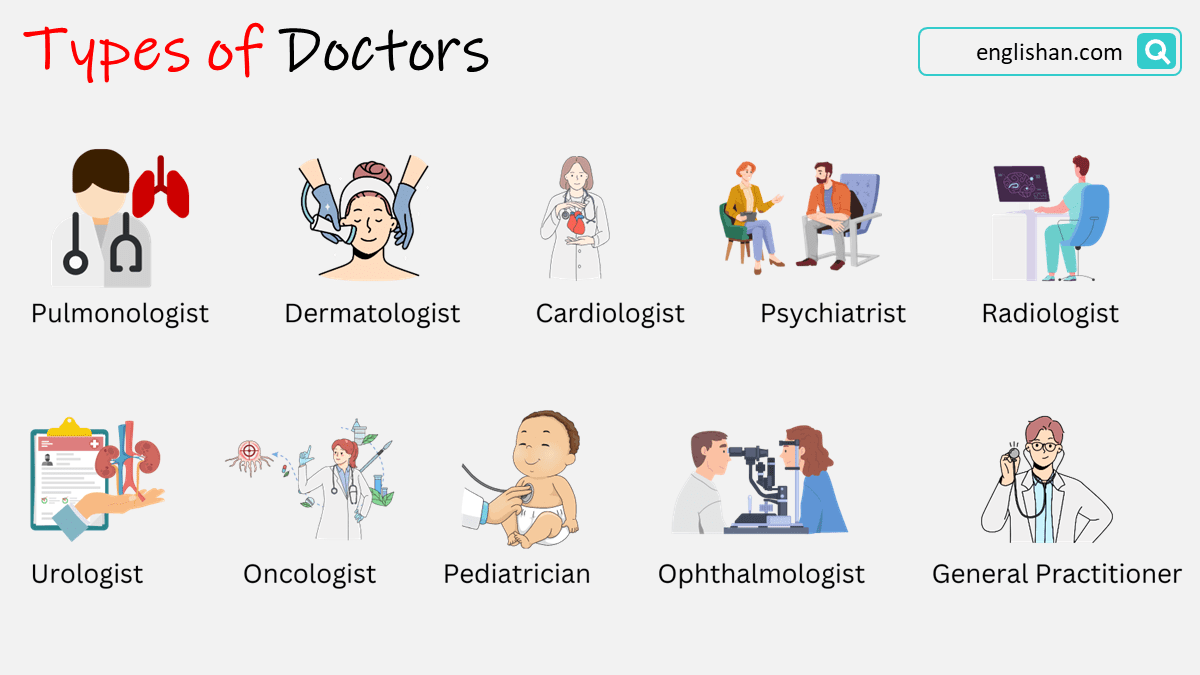In this blog post, we will help you understand the different types of doctors and their medical specializations. Each doctor has unique expertise in treating specific health conditions. Knowing these specializations can help you understand how doctors focus on particular areas of healthcare and provide the best treatment.
To learn more vocabulary on different topics, visit our vocabulary category.
List of Doctors with Their Specializations
- General Practitioner (GP): Provides overall healthcare and refers to specialists.
- Pediatrician: Cares for children’s health.
- Dermatologist: Treats skin, hair, and nail conditions.
- Cardiologist: Deals with heart and blood vessel issues.
- Ophthalmologist: Focuses on eye care and diseases.
- Orthopedic Surgeon: Specializes in bone and joint problems.
- Neurologist: Treats nervous system disorders.
- Psychiatrist: Manages mental health conditions.
- OB/GYN: Women’s reproductive health expert.
- Anesthesiologist: Administers anesthesia during procedures.
- Radiologist: Interprets medical imaging.
- ENT Specialist: Ear, nose, and throat doctor.
- Urologist: Handles urinary and male reproductive issues.
- Endocrinologist: Treats hormone and gland disorders.
- Gastroenterologist: Focuses on digestive system problems.
- Pulmonologist: Specializes in lung and respiratory issues.
- Nephrologist: Manages kidney diseases.
- Oncologist: Treats cancer.
- Rheumatologist: Deals with autoimmune and musculoskeletal disorders.
- Allergist/Immunologist: Manages allergies and immune conditions.
- Emergency Medicine Physician: Handles acute and life-threatening cases.
- Pathologist: Diagnoses diseases from tissues and fluids.
- Infectious Disease Specialist: Treats infections.
- Sports Medicine Physician: Cares for sports-related injuries.
- Geriatrician: Focuses on elderly patients.
- Plastic Surgeon: Performs cosmetic and reconstructive surgeries.
- Neonatologist: Specializes in newborn care.
- Pain Management Specialist: Treats chronic pain.
- Hematologist: Deals with blood disorders.
- Sleep Medicine Specialist: Addresses sleep-related issues.
- Geneticist: Studies inherited traits and genetic disorders.
- Nephrologist: Specializes in kidney diseases and disorders.
- Interventional Radiologist: Uses imaging to guide minimally invasive procedures.
- Hepatologist: Focuses on liver diseases and conditions.
- Hematopathologist: Diagnoses blood and bone marrow disorders.
- Neurosurgeon: Performs surgeries on the nervous system, including the brain and spine.
- Palliative Care Physician: Provides relief from symptoms and supports quality of life in serious illnesses.
- Critical Care Physician: Manages patients in intensive care units.
- Podiatrist: Specializes in foot and ankle conditions.
- Addiction Medicine Specialist: Treats substance use disorders.
- Forensic Pathologist: Investigates cause of death in legal cases.
- Thoracic Surgeon: Performs surgeries on the chest, including the lungs and esophagus.
- Intensivist: Focuses on critical care in the ICU.
- Clinical Geneticist: Diagnoses and manages genetic disorders in patients and families.
- Geriatric Psychiatrist: Specializes in mental health care for the elderly.
- Medical Geneticist: Studies genetic conditions and their inheritance.
- Neuropsychiatrist: Evaluates and treats psychiatric issues related to brain function.
- Vascular Surgeon: Performs surgeries on blood vessels.
- Bariatric Surgeon: Specializes in weight loss surgeries.
- Reproductive Endocrinologist: Focuses on fertility and hormonal issues.


FAQs
The highest doctor specialties are often considered to be neurosurgery (brain and spine surgery) and cardiothoracic surgery (heart and lung surgery). These fields are very complex and require years of training. However, all doctor specialties are important in different ways!
The best doctor course depends on what you like. Here are some options:
General Medicine – Treats many kinds of illnesses.
Surgery – Involves performing surgeries.
Pediatrics – Works with children.
Orthopedics – Focuses on bones and joints.
Cardiology – Specializes in heart health.
Pick the course that interests you the most!
The highest level of doctor is usually a specialist or surgeon in a difficult field, like neurosurgery (brain surgery) or cardiothoracic surgery (heart and lung surgery). These doctors have years of extra training to become experts in their area.
Doctors in fields like cardiology, orthopedic surgery, and neurology have the highest scope due to high demand and job opportunities.
Some of the rarest types of doctors are:
Neurosurgeons – Brain and spine surgeons.
Pediatric Cardiologists – Heart doctors for children.
Transplant Surgeons – Doctors who do organ transplants.
Geneticists – Doctors who study genetic diseases.
These doctors have special skills and training in rare fields.
You May Also Like






